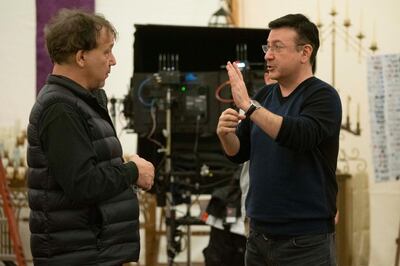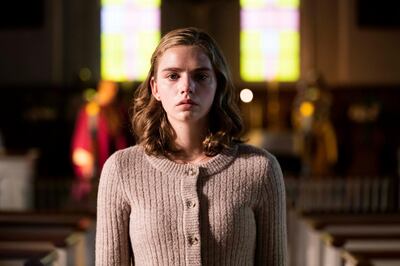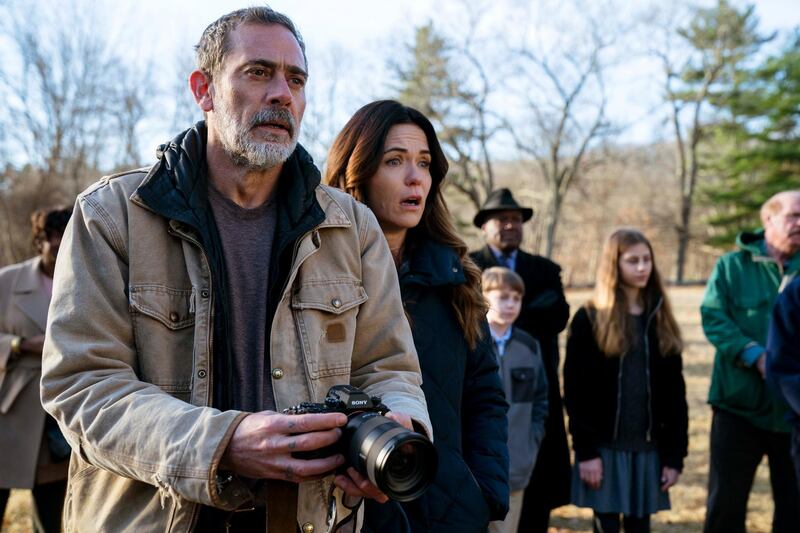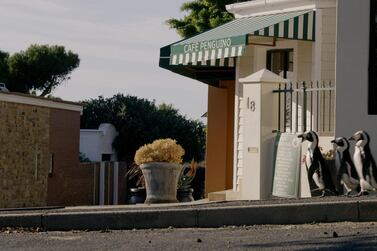Few names are as synonymous with the horror genre as Evil Dead creator Sam Raimi and esteemed novelist James Herbert, author of genre classics such as The Fog and The Rats. One name that isn't quite so familiar is Evan Spiliotopoulos.
That's not to say you haven't seen any of Spiliotopoulos's work. As a screenwriter, he's been responsible for blockbusters such as The Huntsman: Winter's War and Beauty and the Beast. Now, after two decades of putting words on the page for some of Hollywood's biggest names, he's finally getting in the director's chair himself for his own adaptation of Herbert's novel Shrine, which Raimi executive-produces.
Spiliotopoulos insists he had never planned on making the transition from writer to director, but his long-standing love for Herbert's novel finally gave him an irresistible opportunity. "It's just that I really loved this book since I was a teenager and I really wanted to make a movie, but as a screenwriter," he explains. "In 2019 [Sony] Screen Gems came on board, but they made the crazy offer to direct it. My initial reaction was no. I've seen what directors go through I don't want to do this."
The addition of Raimi to the mix finally persuaded the fledgling director to make the leap, although he admits that he was initially convinced that the horror veteran would “realise I’m an idiot” and take over directing duties himself. This didn’t happen, and the fruits of Spiliotopoulos's labour will hit screens in the UAE this weekend.
Shrine tells the story of disgraced, former big-time journalist Gerry Fenn (The Walking Dead's Jeffrey Dean Morgan), who travels to a small US town where there have been reports of miracles taking place around a young deaf and mute girl. Alice is being raised by her uncle, the local priest, and inexplicably regains her speech and hearing.
After years of making a living from covering fake stories of the supernatural for nonsense-hungry tabloid readers, Fenn suspects he may have finally found a story that, though fantastical, is true.
Shrine fits comfortably into a well-ploughed furrow of horror with heavily religious undertones. From classics such as The Exorcist and The Omen to more recent films such as the Abu Dhabi-shot Deliver Us from Evil, priests and religious imagery have long been a staple of the genre.
Having both written and directed Shrine, however, Spiliotopoulos says he had a clear idea of how to make sure his own film stood out in a crowded field. "What I really like about this film is that it's a combination of two different genres – the classic, supernatural thriller and the journalism thriller along the lines of Shattered Glass and Spotlight. It's about a journalist who was caught fabricating stories and how his career was ruined," the director says. "So, there's the combination of a totally amoral journalist who's thrown into the story of a lifetime, and then discovers that he's opened Pandora's box and the only way to save this girl that he's come to care about, and the world, is to destroy himself."
Spiliotopoulos even goes as far as to say that he came to see his film as a kind of sequel to Shattered Glass. That 2003 film tells the true story of disgraced journalist Stephen Glass, whose career unravelled when it transpired that most of his stories were entirely fictitious.

In Shrine's reality, the director explains, Glass, or Fenn, is now working for The National Enquirer, home to headlines such as "Hillary Clinton adopts alien baby", when he stumbles across a real supernatural occurrence.
This isn't the only parallel between the film and the real world news agenda: "Fake news has entered the zeitgeist in the last four years, and Fenn personifies this," the director says. "This is a story about how a community suffers when a journalist who has been entrusted with reporting the truth manipulates the facts for their own advantage. We happen to have a ghost story going on, but imagine if the ghost is something like he's hiding pollution, or he twists somebody's words to not what they said. Communities suffer because of that, and we just happen to do it with a ghost."
The film may to a degree be a cautionary tale about the dangers of accepting truths blindly without critical assessment, but Spiliotopoulos and his crew were forced to indulge in some manipulation of the truth themselves, thanks to something even more in the zeitgeist than fake news: Covid-19. The production was shut down in March last year because of the virus. When filming resumed, the crew had to get a little creative.

"We had a big funeral scene to shoot, and we couldn't fill this church with extras," the director reveals. "What we could do is hire teams of families of three up to 10, and space them apart. We had to shoot, change their clothes, move them around. When you see that scene, if you pause it on Blu-ray, it's the same three families, shot 10 times."
Given the circumstances, we can probably forgive the team for using a degree of creative licence since, as Spiliotopoulos notes, the alternative would have been to have no film at all: “It was insane, but what got us through it was that everybody just wanted to finish it,” he says. “The sense of accomplishment, you know? I can’t imagine not having finished it because for all the work that had gone into it just to go like that, it would have been heartbreaking.”
Shrine is in UAE cinemas from Thursday, April 22






